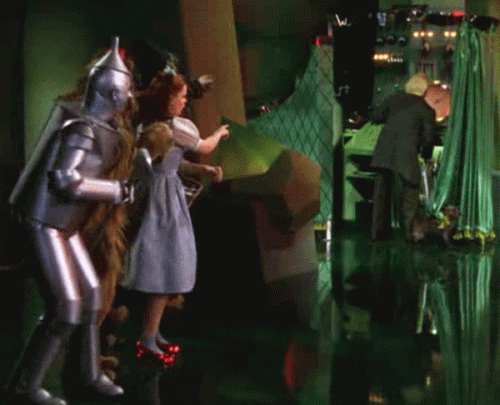
Toto Reveals the Man Behind the Curtain
We have a lot to figure out. Yesterday, a student dropped by my office and told me that she had come across this blog. She then shared with me briefly how she and some of her peers had felt very uncomfortable and suddenly afraid to speak in their first-year classes because the comments and concerns that they had about the material were so different than what they were supposed to be thinking and talking about.
She emphasized that her professors in these classes were kind and approachable people—thus the discomfort and fear were not inspired directly by them. To me, this further supports Mertz’s thesis that there is something inherently authoritarian in the material, the way of knowing and the world view of legal language as we know it.
This authoritarianism can be embodied in the persona of the professor, but need not be for the authoritarian message to come across. Looking to the story of this student, even “progressive” non-authoritarian professors adhere to some tradition in conveying legal language and knowledge, with similar effects on students. This is also consistent with Mertz’s findings.
It is premature for me to suggest that this model could or should be changed. What I am interested in exploring at this moment is the structure of our pedagogy and its effect on our students, and in particular, on diverse students—a category that I am understanding to include students who subectively experience themselves as outsiders in any number of ways. (Thus, diverse students might include students of color, but not necessarily all students of color; some female students, but not all female students; students who are the first in their families to pursue a professional degree; Christian students; students for whom English is a second language; etc. Defining this category is a complex and unwieldy task, and perhaps really not necessary at all. This will be considered at greater length in subsequent posts.)
My instinct is that there is a great deal that may be accomplished by lifting the metaphorical curtain on the authority of legal thought and language (see diagram above). In other words: we must recognize that the law is a hierarchical, authoritarian system and that to operate in it, one must subscribe to and play by the rules of the game. But this does not mean that the rules are necessarily right or good. It also does not mean that the value system reflected in those rules needs to be internalized by law’s practitioners. One can master these tools while still maintaining a separate, authentic self.
As a minor but concise example of this dynamic: on the matter of professionalism, I would tell my students, “You can have tattoos, but you absolutely, positively can’t show them during an interview, at work, to a client or in court.” You are free to be you on your own time, but if you want to play in this game, you have to play by its rules.
I will share a personal experience along these lines. As a law student, I fancied myself a “rebel” and was committed to “expressing my identity.” All fine and good. I shaved my head and sported facial piercings while a student at Yale (it’s true) and I don’t think anyone much cared. But one day I was visiting the Liberian Embassy in Washington DC, trying to get a birth certificate for a client of mine from Immigration Clinic who was applying for asylum. And the official at the Embassy with whom I was negotiating was fascinated by my piercings, and wouldn’t stop talking about them. And at that moment I realized that my interest in “expressing myself” was doing my client a disservice. It was inappropriate and misdirected.
I couldn’t integrate what I thought of as my “authentic self” wholesale into my profession. But neither did I have to abandon those parts of me that didn’t fit into my professional persona. I had to recognize their relationship to one another, know when to keep them separate, and when to allow them to inform each other.
I’m talking about the trivialities of physical appearance, but I could just as well be talking about my feminism, or my sense of social justice.

You have to put on the suit. You have to color it gray. But it’s just that— a costume you put on because it works. It’s playing by the rules of the game and it lets you get the job done, which is the point, after all. It is not all of who you are.
The somewhat trite examples I offer still point to a larger phenomenon and an important question: namely, what is the expected relationship between ourselves—and particularly our private selves, the self we experience in our home community, the deeply personal values we hold—and our profession?
Hannah Arendt would say that there has to be a separate, protected private sphere in order for a vibrant public sphere to exist. Applied to the context of our profession, I think this means that we cannot and should not expect or allow our entire selves to be colonized by the values of the profession. And we need to examine the extent to which traditional legal education demands that.
One solution to the alienation from self that many law students experience—to their detriment and, I would argue, to the detriment of the profession—would be to teach the same concepts and language as we always have, but to lift the curtain while we do so. That is: to acknowledge the way the law and lawyers benefit from structures of power and authority, and to examine when using these structures is ethical and when it is not.

I identify with your comments about clothing. I recently met with some VP’s from my former employer about a project I’m working on. They all commented on my “upgraded” wardrobe. I responded that I had decided to put on the costume of my intended new profession. The general counsel’s smile dropped. “It’s a uniform,” she admonished me. I’m not sure it can’t be both.
Thanks for the comment Owen – that is a wonderul and amusing story. I guess the suit can’t be both a costume and a uniform if you’re a “true believer” in the importance and authority of the law and its practitioners; if one is a bit more of a skeptic, then both descriptions work just fine.
Skeptic or cynic.
I hope you don’t mind a non-law student joining the discussion. I graduated from CU law in 1984, practiced litigation for about 10 years, and then decided to leave the profession. In the past couple of years, I’ve attended several law school classes (at the invitation of Judge Bob Russel) to speak about the practice of law, and some of the de-humanizing effects that Professor Krieger discusses.
At the risk of moving the discussion in an unwanted direction, I’ll posit a theory that perhaps you’ll find worth pursuing.
Legal training and the structure of the law are designed to encourage practitioners to ignore questions of morality in favor of the written word (statutes, cases, etc). Legal training discourages lawyers from thinking about what is right and encourages them to analyze what is legal. (Witness your experience as a summer associate.) This way of thinking is beneficial in certain contexts, but because lawyers spend so much time doing it, it creeps into all aspects of their lives. Ultimately, this way of thinking, if not consciously limited, is corrosive to the soul, and has many deleterious consequences that we see in the profession.
Here’s another idea for discussion: What is the role (if any) of forgiveness in the law?
Glad to see that you are hosting this blog. It’s important stuff.
Jamie – thank you so much for taking the time to comment. Non-law students are absolutely welcome and encouraged to join the discussion, and I’m glad you did so. Your perspective makes a lot of sense to me. Some of the analytical tools that are useful to us in our profession—detachment, objectivity, the ability to construct categories—can be very detrimental in other spheres of human relations. I would love to learn more about what you discuss in your presentations to law students.
You DO have cartoons!
It’s not just a rumor.
Another non-law student here – 11-year lawyer-litigator. Found this post via Veronica Rossman’s Facebook page.
I like your points about professional expectations, the various identities each of us maintains and the necessity to observe certain conventions in order to be effective advocates representatives.
One point I would add is that the interrogation of identity should go both ways. For myself, this means that I try to look closely at my own motivations/needs as they relate to assertions of individuality in my professional life.
My own experience is that my desire to assert some perceived individual identity in the face of contrary societal/professional norms is often little more than personal vanity (and I recognize that this vanity itself is part of my identity). This is not to say that one should swallow the legal authoritarian/hierarchical doctrine whole without question, but that the same questions and “grain of salt” adoption that you describe as the appropriate relationship to the theater/performative aspects of being a lawyer should also be applied to those aspects of being “me.”
I am not my piercings, haircut or tattoos, and I think it is important to recognize that, just as one recognizes that when I put on the “gray suit,” the gray suit is not me.
Hi Kevin – thank you for the very nicely stated comment. i think your perspective is valuable to both law students and your peers. I am also now 11-years out of school, and I sometimes wonder why it took me so long to find that grain of salt—to figure out that there are strategic relationships between one’s personal and professional self. Why did I so enthusiastically drink the Kool-Aid, even though it was making me sick? I’m certain that individual personality has a lot to do with it, and a good dose of circumstances, culture and experience. I would be interested in learning more about what led you to the awareness you have today.